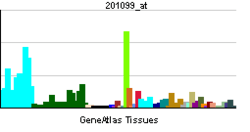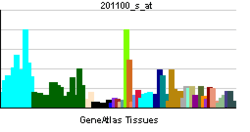USP9X
Probable ubiquitin carboxyl-terminal hydrolase FAF-X is an enzyme that in humans is encoded by the USP9X gene.[1][2]
Function
This gene is a member of the peptidase C19 family and encodes a protein that is similar to ubiquitin-specific proteases. Though this gene is located on the X chromosome, it escapes X-inactivation.
Interactions
USP9X has been shown to interact with:
References
- ↑ Jones MH, Furlong RA, Burkin H, Chalmers IJ, Brown GM, Khwaja O et al. (Mar 1997). "The Drosophila developmental gene fat facets has a human homologue in Xp11.4 which escapes X-inactivation and has related sequences on Yq11.2". Hum. Mol. Genet. 5 (11): 1695–701. doi:10.1093/hmg/5.11.1695. PMID 8922996. Check date values in:
|year= / |date= mismatch(help) - ↑ "Entrez Gene: USP9X ubiquitin specific peptidase 9, X-linked".
- ↑ 3.0 3.1 Taya S, Yamamoto T, Kanai-Azuma M, Wood SA, Kaibuchi K (Dec 1999). "The deubiquitinating enzyme Fam interacts with and stabilizes beta-catenin". Genes Cells 4 (12): 757–67. doi:10.1046/j.1365-2443.1999.00297.x. PMID 10620020.
- ↑ 4.0 4.1 Al-Hakim AK, Zagorska A, Chapman L, Deak M, Peggie M, Alessi DR (Apr 2008). "Control of AMPK-related kinases by USP9X and atypical Lys(29)/Lys(33)-linked polyubiquitin chains". Biochem. J. 411 (2): 249–60. doi:10.1042/BJ20080067. PMID 18254724.
- ↑ Taya S, Yamamoto T, Kano K, Kawano Y, Iwamatsu A, Tsuchiya T et al. (Aug 1998). "The Ras target AF-6 is a substrate of the fam deubiquitinating enzyme". J. Cell Biol. 142 (4): 1053–62. doi:10.1083/jcb.142.4.1053. PMC 2132865. PMID 9722616.
Further reading
- D'Andrea A, Pellman D (1998). "Deubiquitinating enzymes: a new class of biological regulators". Crit. Rev. Biochem. Mol. Biol. 33 (5): 337–52. doi:10.1080/10409239891204251. PMID 9827704.
- Andersson B, Wentland MA, Ricafrente JY, Liu W, Gibbs RA (1996). "A "double adaptor" method for improved shotgun library construction". Anal. Biochem. 236 (1): 107–13. doi:10.1006/abio.1996.0138. PMID 8619474.
- Yu W, Andersson B, Worley KC, Muzny DM, Ding Y, Liu W et al. (1997). "Large-scale concatenation cDNA sequencing". Genome Res. 7 (4): 353–8. doi:10.1101/gr.7.4.353. PMC 139146. PMID 9110174.
- Taya S, Yamamoto T, Kano K, Kawano Y, Iwamatsu A, Tsuchiya T et al. (1998). "The Ras target AF-6 is a substrate of the fam deubiquitinating enzyme". J. Cell Biol. 142 (4): 1053–62. doi:10.1083/jcb.142.4.1053. PMC 2132865. PMID 9722616.
- Taya S, Yamamoto T, Kanai-Azuma M, Wood SA, Kaibuchi K (1999). "The deubiquitinating enzyme Fam interacts with and stabilizes beta-catenin". Genes Cells 4 (12): 757–67. doi:10.1046/j.1365-2443.1999.00297.x. PMID 10620020.
- Dias Neto E, Correa RG, Verjovski-Almeida S, Briones MR, Nagai MA, da Silva W et al. (2000). "Shotgun sequencing of the human transcriptome with ORF expressed sequence tags". Proc. Natl. Acad. Sci. U.S.A. 97 (7): 3491–6. doi:10.1073/pnas.97.7.3491. PMC 16267. PMID 10737800.
- Noma T, Kanai Y, Kanai-Azuma M, Ishii M, Fujisawa M, Kurohmaru M et al. (2002). "Stage- and sex-dependent expressions of Usp9x, an X-linked mouse ortholog of Drosophila Fat facets, during gonadal development and oogenesis in mice". Gene Expr. Patterns 2 (1-2): 87–91. doi:10.1016/S0925-4773(02)00290-3. PMID 12617843.
- Murray RZ, Jolly LA, Wood SA (2004). "The FAM deubiquitylating enzyme localizes to multiple points of protein trafficking in epithelia, where it associates with E-cadherin and beta-catenin". Mol. Biol. Cell 15 (4): 1591–9. doi:10.1091/mbc.E03-08-0630. PMC 379258. PMID 14742711.
- Bouwmeester T, Bauch A, Ruffner H, Angrand PO, Bergamini G, Croughton K et al. (2004). "A physical and functional map of the human TNF-alpha/NF-kappa B signal transduction pathway". Nat. Cell Biol. 6 (2): 97–105. doi:10.1038/ncb1086. PMID 14743216.
- Fu GK, Wang JT, Yang J, Au-Young J, Stuve LL (2004). "Circular rapid amplification of cDNA ends for high-throughput extension cloning of partial genes". Genomics 84 (1): 205–10. doi:10.1016/j.ygeno.2004.01.011. PMID 15203218.
- Rush J, Moritz A, Lee KA, Guo A, Goss VL, Spek EJ et al. (2005). "Immunoaffinity profiling of tyrosine phosphorylation in cancer cells". Nat. Biotechnol. 23 (1): 94–101. doi:10.1038/nbt1046. PMID 15592455.
- Al-Hakim AK, Göransson O, Deak M, Toth R, Campbell DG, Morrice NA et al. (2005). "14-3-3 cooperates with LKB1 to regulate the activity and localization of QSK and SIK". J. Cell. Sci. 118 (Pt 23): 5661–73. doi:10.1242/jcs.02670. PMID 16306228. Vancouver style error (help)
- Kimura K, Wakamatsu A, Suzuki Y, Ota T, Nishikawa T, Yamashita R et al. (2006). "Diversification of transcriptional modulation: large-scale identification and characterization of putative alternative promoters of human genes". Genome Res. 16 (1): 55–65. doi:10.1101/gr.4039406. PMC 1356129. PMID 16344560.
- Beausoleil SA, Villén J, Gerber SA, Rush J, Gygi SP (2006). "A probability-based approach for high-throughput protein phosphorylation analysis and site localization". Nat. Biotechnol. 24 (10): 1285–92. doi:10.1038/nbt1240. PMID 16964243. Vancouver style error (help)
- Mouchantaf R, Azakir BA, McPherson PS, Millard SM, Wood SA, Angers A (2006). "The ubiquitin ligase itch is auto-ubiquitylated in vivo and in vitro but is protected from degradation by interacting with the deubiquitylating enzyme FAM/USP9X". J. Biol. Chem. 281 (50): 38738–47. doi:10.1074/jbc.M605959200. PMID 17038327.
- Olsen JV, Blagoev B, Gnad F, Macek B, Kumar C, Mortensen P et al. (2006). "Global, in vivo, and site-specific phosphorylation dynamics in signaling networks". Cell 127 (3): 635–48. doi:10.1016/j.cell.2006.09.026. PMID 17081983.

